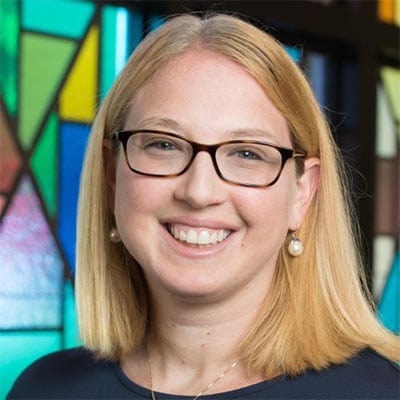 D-Keine/Getty Images
D-Keine/Getty Images Editor’s Note: The following sermon was delivered by Rabbi Nicole Guzik at Sinai Temple on February 24.
“But you don’t look Jewish.”
Growing up in Orange County, with blonde hair and blue eyes, this was a common refrain. You don’t look Jewish. And as an 11- or 12-year-old, I didn’t know how to respond to my non-Jewish peers. Thirty years later, I realize — when someone said to me, “You don’t look Jewish,” they thought they were offering me a compliment.
I should have responded, “What does it mean to look Jewish?” I have the blessing of being a rabbi in this congregation, where being a Jew looks very different depending on with whom you’re speaking. Light skin, dark skin, blue eyes, red hair, brown hair — come to Sinai Temple and you will quickly find out that while we look different, while our customs may differ, while our traditions and observance levels run on a continuum, each of us is a Jew in our very own right. And for that we should be very proud.
I bring this up because of Dara Horn’s article in the Atlantic titled “Why the Most Educated People in America Fall for Antisemitic Lies.” I encourage you to read the piece, but the premise is the following: Antisemitism is systemic. For thousands of years, it has been the elite — the professors, the priests, the scholars, the professional debaters — who have manipulated the greater world to believe that Jews represent evil; moreover, these very people have brainwashed the greater population that we do not have a right to exist. In public forums, throughout history, Jews were and are considered the nemesis, the enemy. Dara Horn cites historian David Nirenberg, who published a book in 2013 called “Anti-Judaism.” About Nirenberg, Horn writes, “When one reads through his carefully assembled record of 23 centuries’ worth of intellectual leaders articulating their societies’ ideals by loudly rejecting whatever they consider ‘Jewish,’ this deep neural groove in Western thought becomes difficult to dismiss, its patterns unmistakable.”
Nirenberg gives several examples: If capitalism was evil, Jews were capitalists; if communism was evil, Jews were communists… “Anti-Judaism,” Horn explains, “thus becomes a righteous fight to promote justice.” Nirenberg teaches: “Anti-Judaism should not be understood as some archaic or irrational closet in the vast edifices of Western thought. It was rather one of the basic tools with which that edifice was constructed.”
In other words, today, whether it is on the college campus, during a rally or on social media, we see history repeating itself.
Antisemitism breeds and festers as an ingrained, pervasive infection that has existed within our most elite institutions and forums for thousands of years.
We have stood on this bimah reminding, pleading, preaching that anti-Zionism is antisemitism. That is as clear as day. Attacks on Israel, attacks on the Jewish state give permission for antisemitism to crawl out of the corner. It lurks. Antisemitism is always there.
We must name it for what it is—because no one else seems willing to — antisemitism is racism.
And this morning, I want us to open our eyes to something else: Even though antisemitism is rising beyond belief — according to the ADL almost 400% since Oct. 7 — in the view of those who divide the world between oppressor and oppressed, anti-Jewish actions aren’t seen as truly unjust. When Jews are “othered,” when someone says, “He Jewed me down” (meaning, Jews are cheap), when someone says, “The Jews drink the blood of Jesus,” when someone says, You don’t look Jewish because Jews have big noses, when Jews are called Nazis both in person and online, we must name it for what it is — because no one else seems willing to — antisemitism is racism.
This is the first point I want you to leave with today: Antisemitism— even if a minority is outwardly educated, successful or resilient— is another form of racist behavior.
We fight the systemic lie of antisemitism by calling out antisemitism, every single time. You can be educated, wealthy and accomplished and still suffer from Jew-hate. Every other minority or oppressed population is included in DEI trainings or modules. We must insist: Whether it is a university setting or professional institution, if Jews are not seen as a people discriminated against, we, the Jewish people, will continue to be targeted as the ones who are never truly in distress.
In 2021, David Baddiel wrote the book “Jews Don’t Count.” And he explains that because Jews “can hide,” because we can pass as non-Jews, there is an assumption that the racism is different. That the racism is lessened. He writes, “This would suggest that Jews don’t really suffer from being thought of as different as long as people don’t know they’re Jews.” In other words, we won’t suffer racist behaviors as long as we don’t admit we’re Jewish. As long as we hide.
You might be thinking, But rabbi, we aren’t exactly a race. David Baddiel explains that we must put ourselves in the minds of the antisemites. He says, “To fight antisemitism, you have to be aware of how the antisemites see your Jewishness, which is as a thing in your blood, not your spiritual soul.”
Make no mistake about it — this isn’t a competition. Who wants to win the title for most hated? But the Jewish people are fighting an uphill battle against history. We won’t stay silent or invisible any longer. Perhaps there was a time in which American Jews thought assimilation was the key to acceptance into Western society. But we have learned the hard way that antisemitism isn’t going away. Not on the right. And not on the left.
Dara Horn was astonished by what she saw in her recent observations on the college campus. She writes, “At a Shabbat dinner I attended at one college, students were around the table sharing what they wished they could say to their non-Jewish friends. I wish I could say I want to spend a semester in Israel. I wish I could say I work at a Jewish preschool. I wish I could say I volunteered at a Jewish hospital.” She writes, “I sat at the table stupefied. They were in hiding.”
In the Purim story, Esther is cautioned to keep her Jewish identity to herself. And yet, in a story where everything turns upside-down, it is only when she “outs” herself as a Jew does that story turn from one of a potential massacre to the Jews claiming victory.
There is a woman in our tradition who, at first, thought hiding, or assimilation, was her entryway into rising among royalty. In the Purim story, Esther is cautioned to keep her Jewish identity to herself. And yet, in a story where everything turns upside-down, it is only when she “outs” herself as a Jew does that story turn from one of a potential massacre to the Jews claiming victory. And when she hesitates to admit her Jewish identity, Mordecai reminds her, “Do not imagine that you, of all of the Jews, will escape with your life by being in the king’s palace. And who knows, perhaps you have attained to a royal position for a moment like this.”
I forgot to mention that one of the reasons why my non-Jewish peers would comment on my looks is because I was always involved in Jewish life. Big surprise. My parents were involved in our synagogue. I attended USY events and spent my bat mitzvah money going on a six-week summer trip to Israel. And my non-Jewish and, sometimes, even my Jewish peers would comment, “Wow. You are so Jewish.” Again, this wasn’t meant as a compliment.
Today, here is what I would have said. Yes, I am so Jewish. And yes, this is what a Jew looks like. Acts like. Sounds like. Isn’t it great?
And whether you keep Shabbat, whether you attend services twice a year, whether or not you even step into a synagogue, the world needs to hear and needs to see the Jewish masses, through the different ways we practice and the different ways we look — publicly proclaiming — I am a Jew.
Jews around the world — in whichever way you express your Judaism — hide no more.
Because perhaps we, the Jewish people, have risen to this time in history for a moment like this. A time in which we proudly explore and publicly honor our Jewish identity. A reclamation of the word Jew. Not used as a word to denigrate. But used as a word to self-celebrate.
Could it be that our own reclamation of the word Jew will be a step forward towards dismantling antisemitism?
How can we begin to ask others to respect who we are if we aren’t willing to reveal who we are? Respect begins with us.
So, this is a call to anyone out there who is listening. I don’t want to preach to the choir, we are here. But to everyone out there: Please, we need you to publicly and positively self-identify as a Jew. How can we begin to ask others to respect who we are if we aren’t willing to reveal who we are? Respect begins with us.
The Ner Tamid, the eternal light, stands in every sanctuary around the world—a reminder of the light that was lit in the Mishkan, and later in the Temples in Jerusalem. An eternal light as reminder to the Jewish people: we are an “Or LaGoyim.” A light unto the nations.
This is who we are. And our mantra must be clear: I am a Jew and I’m not going anywhere.
Because all of us — we, the Jewish people — are made for a moment like this.
Shabbat Shalom.
Rabbi Nicole Guzik is senior rabbi at Sinai Temple.























 More news and opinions than at a Shabbat dinner, right in your inbox.
More news and opinions than at a Shabbat dinner, right in your inbox.